No time to study? 168 hours to succeed!
Great communities make great people. Great people make great communities. Action in love. Love in action.
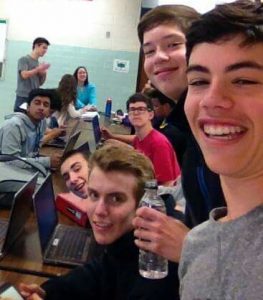
It is that time of year again. Students, student-athletes, parents, teachers, and coaches are all wondering how to handle the academic workload. How to manage time. How to make sure that the people in our lives meet whatever standards that have been set. How to ensure peaceful and joyful growth. How to love in a loving way. How to love in traffic and chaos. How to love out loud.
The great divide in academic success comes at the intersection of make an excuse or make a way. The sign by the side of the road “that I do not have the time.” On the other side of the street is a sign that says “168.” One is an excuse. One is the right way.
I do not have the time usually means that a person simple can not figure out how to manage their time. Prioritizing is simple once the direction and goal are known. Detours are less likely when the destination is agreed upon.
In the other direction is the 168. 24 hours a day, 7 days a week. Successful people and unsuccessful people both have the same 168 hours per week to accomplish the same things. Successful people use the 168 to set priorities, determine paths, choose focuses, define purposes, and to stay on course to whatever it is that is being pursued.
Misdirected, disconnected, and unfocused people allow time to pass without using their 168 purposefully. The time is wasted and spent, leaving a vacuum of missed opportunities. In retrospect, there are short and direct roads to success to look down. In hindsight, there were clear roads to success in the rearview mirror.
Forward, there are ways to help our young people manage time. There are ways to help them stay on the right path, the easier journey, and the successful way.
Students
If you want control of your 168, plan ahead. Know where your time bank account is being spent. Know what expectations are required of you by teachers, parents, and coaches. Consider sleep, meals, school, faith, family, and chores. Be aware of time spent on social media, watching television, listening to music, talking or looking at your phone, and workouts. Consider your practice time if you are a student athlete, and the time for study halls, homework, film study. Talk to your teachers in advance, let them know your plan for success, and use the connection to make sure that you stay ahead of responsibilities, assignments, quizzes, and tests. Use your time on school buses or car rides home for studying if you are not driving. Use the wait time for practices to begin for studying. Use the wait time after practice for studying. Confirm and reconfirm your projects due dates, and use your time in class for the reason you are there. To learn. Take notes, and share the notes with your teacher to make sure that you did not miss anything. It helps make the teacher better to know that their intended message was heard, received, and learned.
Parents
Know your young persons 168. It is hard to help them if you do not know where time is spent and how. You can not know these things if you do not ask. Ask about time on social media, time talking to potential dates, time texting, surfing the net, and listening to music. Know their assignments due, their work turned in, and what is coming due next. Know the teachers and coaches, and stay connected to them for the mutual benefit of your young person. Do not be afraid to ask or demand for headphones to be off when you are checking in on them. Shared information and IQ keeps the connection strong. Its much easier to help when connected. You know when your child goes left or right off the path if you stay connected to them. Set aside time to check in each week with your child. Ask about assignments turned in, assignments due, and what they are learning. Set aside 5 minutes to look over those notes that were taken. It speaks volume on what is going on. Feel free to ask the teacher to sign them and send home for review. The additional boundary of them knowing that you care and will confirm removes a lot of going off the path.
Teachers
Offer the students access to you for checking notes, communicating with parents, and working with coaches. Truth is, coaches have some additional time and leverage with the student athlete. They have time and reason to check status and standing. The more connected the teacher-parent-coach-student are, the easier it is to be aware of status and standing. This removes the 23rd hour of panic, stress, chaos, and drama of not knowing that something is due, something is wrong, something is missing, something was missed, or something was not turned in. A few moments at the beginning or ending of each week can save the teacher from drama. Use it. Everyone wins.
Coaches
You have the student-athlete’s attention and time. You have access to the student athlete 5-6 days a week, anywhere from 5 to 20 hours a week. Remember, the first thing remains first. Academics. If a student-athlete is struggling academically, the practice can not take precedent over the academics. Use that time to get caught up or ahead. Sometimes, the practice facility needs to be the classroom. Also, there are usually 10-90 teammates who are taking the classes as well. Often, the same classes. Take advantage of the team’s shared IQ. There are other teammates who took notes, got assignments, are working on projects as well. Let the team help the team. We rise together, so let them study together for the greater good of the teammate if needed. Ask for direct help from the teachers. Get weekly updates, or daily ones if possible. Get weekly communications from the parents as well. SHARED IQ. The more we know, the more we share, the more we agree on, the more we do together, the more success we have together. Teams that study together, and learn together, win together.
For some of you, this is already being done. Bravo, and thank you. If you are not, there is hope. The 168 is there for you to use. It has value, and makes sense. Use your 168. It is a plan for success.
LovePrints-Highlight videos (your video may be hurting, not helping)
Posting your highlight video might just guarantee that you are never recruited. There. I said it. I feel better now.
I know. I know. You are proud of your efforts. You made a great play, or two, or ten, and you want to share it with your friends. If you are a parent and you are proud of your youngster, you post in on social media, and no one outside of your circle with see it. Right?
Not so fast.
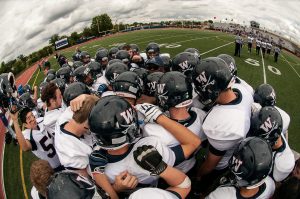
The current trend involves players taking their film study clips, mashing them together, and posting them online. They share with friends, people they want to impress, teammates, family, and their own ego. Here’s what happens…it gets seen. Unfortunately, in most cases, it should not be seen.
You may be showing more than you think. You may be showing more than you want. You may be turning a coach against considering you. There are several reasons why you should share your skills. There are far more reasons to edit what you share, be careful of what you send, and be careful about who you send it to.
Ask your coach to help you. They have a better idea of what a next level coach might want to see. They certainly have a better idea of what they do not want to see. Or, how much of it they want to see. Ask them. They can go through the game tapes and tell you yes or no on which plays to share. They can give you some insight as to what a coach wants to see.
Ask a college coach what he wants to see. It helps to know their system. It helps to know what they use to scout. What kind of players do they have, and what kind do they need. What are the important measurables, and what are the important intangibles. They can tell you how many plays, or how long the video should be. They will also tell you the best way to send it to them. Or the best site to post it on. They can tell you what camps they trust, and importantly, what programs they trust.
What mom and dad posted or videoed might be great for impressing the cute girl, maybe not so much for the Division 1 quarterback coach. What you did vs the second team, while productive, only shows them that your competition isn’t very good. What you did in one game is not the same as what you do every game. A different route, a different pitching sequence, hitting different pitches off different pitchers in different games, shooting contested jumpers against quality defenders, or your third fatigued rep on a weight machine. What is the time of your third 40-yard dash? How do you perform when tired?
No point in sending pro style offensive tapes to some coaches. No reason to send batting cage work to others. No point in showing shooting drills if they do not show shots that you wont take in games, or in their system. No point in showing workouts that do not fit what they do. Ask them what they use, and they will actually appreciate you doing so. You will send them a tape that makes sense to them, works for them, and can tell them what they want and need to know.
Most videos are not watched with detail unless it is a known entity. The highlight reel can be an introduction, or it can be a good bye. The route you ran might work in that one game vs the guy who will never play again, but will it be good enough vs a monster? Are you running the route the way they teach it? Are your hands where they need to be? Are you taking good shots? Are you making next level plays?
If you are sharing videos just to share them, go for it. But, if you are sharing them to be SEEN, make sure that they are benefitting your goal.
Be careful what you say about yourself on film. College scouts and coaches will believe what they see, and not what you tell them.
Great players and coaches make great plans. Great plans make great players and coaches.
Great plans make great players. Great players make great plans.

Action in love. Love in action.
Re-read those sentences. I am posting this for the benefit of those coaches, parents, and athletes who are heading into their summer practices and seasons. I am here to help. I am here to tell you the truth. I am here to make this easier for you all.
You determined the path of your season and success before it started. No, not today. YESTERDAY. Whatever you did yesterday, and its yesterday, and another yesterday has already determined what will happen today and tomorrow. True story. What will be has already been done. You determined it in your actions and your love of what you are about to attempt. Already done. Did you do it? Did you do everything?
Wait. The regular season has not started yet. Its probably the beginning of two a day practices, summer conditioning, playbook understanding, scheme introduction, and technique refinement. How can the season be determined already? This regular season was determined in the improvement season. I did not say OFF SEASON. I did not say RECOVERY season. I said IMPROVEMENT season. I could have said STRENGTHENING Season. Or LEARNING season. Or WINNING season. That is when all of those things are won. That is when all of those things are earned. A coaching buddy likes to speak on NOTHING GIVEN, EVERYTHING EARNED. This happens before the lights come on, before the jerseys are handed out, before the names go on the roster, before the schedules are released, and before anyone knows who you are or how good you are. This is when you build, strengthen, grow, and improve.
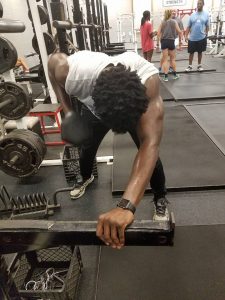
This is when you win. Or, lose.Some of you are asking what to do if you have not put in the work of those you are competing against. What do you do about competing at the same level as those who were already better than you? How can you make the team better if you have not bettered yourself? How can you go where you have never gone if you haven’t done anything to take you there? How can you shine under the lights if you have not sweated your way there in the dark?
Those players and coaches who win have done the work. They prepared. They pondered. They considered. That’s why they are better. You have to have worked harder than those who are in front of you. And, get this…you have to work harder than those who are behind you. They certainly are working hard to catch you. And, to pass you.
There is is. You have to work harder than you ever have. That is where improvement is. It is testing yourself. Expanding your skill sets. Strengthening your body. Sharpening your intellect. Raising your sport IQ. Being a great teammate requires trust. Trust from the coach or players in the work you have put in. Trust in your team or teammates in your being ready for each situation and circumstance. Trust in the person next to you that you are prepared, willing, and able to handle what is next.
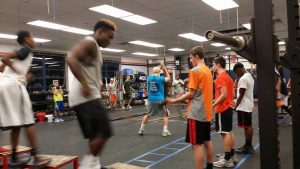
That same coaching buddy and I often spout about THE VACUUM. What are you putting in your vacuum? What are you putting in our vacuum. Is it good? Because that will occupy the vacuum. If it is not, THAT will occupy it. WHAT ARE YOU PUTTING IN IT? What did you put in it yesterday?
That is the truth, and the truth is always shown under the lights. Always. Always.
If you have not put in the work as your season starts, my apologies. Not to you, but to those around you. They will know and they will pay. They are one coach, parent, or coach in the red. That payment always comes due when the lights come on.
If your season has not come yet, get to work. Fill the vacuum. Pay the debt. Be in the black. That is where the games are won. In the dark. In the off…I mean..IMPROVEMENT season.
Go. Epic awaits. In the dark.
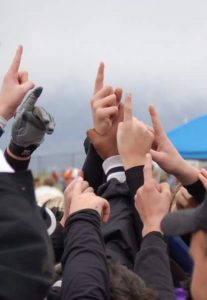
What student-athletes can do with their free summer time.
"What should they be doing with their time during the summer?"
That is a common question. What workouts should they be doing? What camps are the best camps for players to get better? Which camps are the best ones to be seen by college coaches?
All great questions by parents. The answers vary depending on the players skill level and body of work. It also depends on their plans for after high school or college. (Yes, they should have one!) What is missed is the first part of being a student athlete. The student. The part that constantly keeps athletes from playing at the next level or at the level in which they feel they belong talent wise. Not all of them have Division 1 talent. Not all of them have Division 1 size, speed, or agility. All of them need to have Division 1 study habits and academic habits.
Why not spend some of the summer time to get ahead academically? Why not work on the main reason you go to school? It is now July, and every parent and student has a great idea of their academic strengths, weaknesses, and classes to come in the fall. Why not prepare? Why not get ahead?
If the athlete is weak at some part of his athletic game, they will spend every free hour of the day shooting hoops, throwing or catching passes, or in the batting cage to improve their chances to succeed come next season. Need to improve at free throws? Spend more time on them in the off season! Trouble kitting the curve ball? Spend more time on it in the off season! Difficulty with the corner kick? Off season will fix it? Need to run faster or get stronger? Off season baby!
The same thing applies to academics. You have from June until August to improve. Why not use this time to get better at the subjects that cause you stress and drama? Parents have no problems forking up checks to have junior work out with the local dad camp, but wont apply that same logic to academics, which should be the natural focus and priority. I understand applying your free summer time to the games you love, but doesn't it make sense to apply some of that free time to the courses that are firmly ahead in the student athletes path?
Just a thought. Maybe that GPA could use some summer reps as well.
Go. Be Epic.
